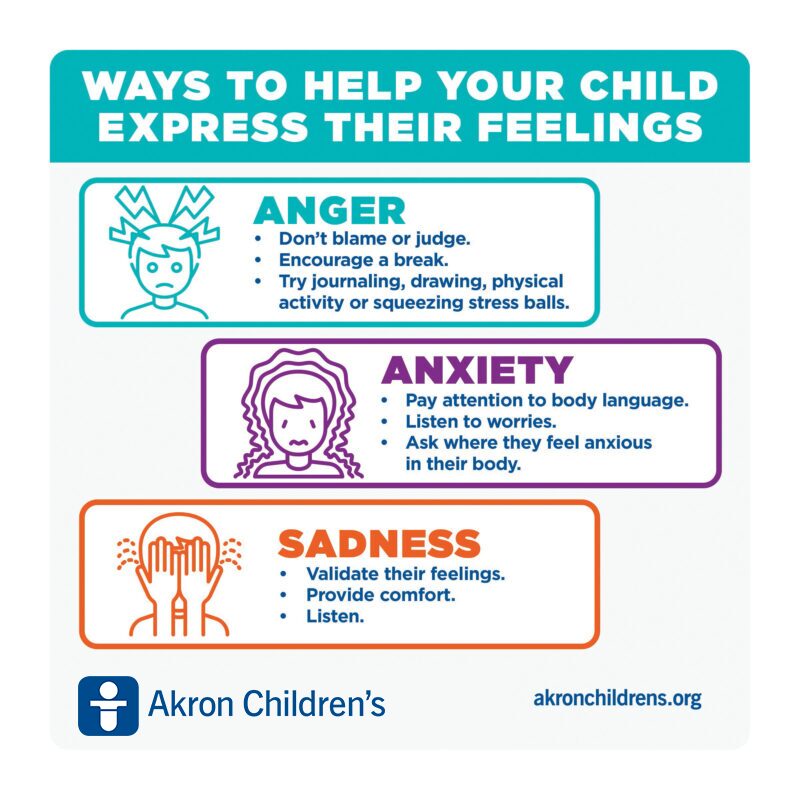More than one in five children in Ohio has been exposed to multiple adverse childhood experiences, or ACEs, that indicate the experience of a traumatic event like childhood abuse, neglect or household challenges, such as parental incarceration or substance use, according to The Health Policy Institute of Ohio.
Things like car accidents, hospital stays, the death of a loved one or pet can also be traumatic for a child. Not only that, but what is traumatic for one person may not be traumatic for another.
If the feelings from a trauma are not addressed, it can have immediate and long-term negative effects.
“Trauma is a prolonged activation of our stress response system, as well as a lack of positive buffering relationships with adults,” explained Missy McClain, community outreach coordinator for Akron Children’s School Health Services. “It’s not just about experiencing a sad or scary event, it’s about experiencing those stressors alone, or not having adults to talk to or to help.”
A positive and buffering relationship with an adult can help a child understand what is happening, help them navigate any feelings they have around the event, and help them articulate those feelings while building resiliency and coping skills, says McClain.
“We don’t have to be a professional to buffer stressors for our children.” said McClain. “It’s the everyday things that we do as parents. We can empathize with their experience by saying, ‘Yeah, I get why you would feel anxiety around this, that was a scary thing we experienced.’ It’s all the normal reassurance and support that we give to our children, the loving care, patience and understanding.”
What isn’t effective when dealing with a traumatic event is dismissing a child’s feelings or refusing to talk about the situation.

Though it might seem like you can prevent your child or family from experiencing trauma, that’s not the case, said McClain.
“Trauma can happen to anyone, and it can sometimes be uncontrollable. The important thing to remember about trauma is that we can help our children cope and build resilience.” she said.
Some children may experience chronic trauma like a parent or caregiver who is suffering with chronic illness, an incarcerated loved one, or a loved one who is dealing with addiction. They may not have a reliable adult to buffer the chronic stressors and may need to seek out a trusted adult at school or in their community.
McClain, who serves as School Based Social and Emotional Learning, Trauma, and Resiliency Coach, visits schools throughout several counties to educate teachers and staff about childhood trauma, and the impact of trauma on a student’s behavior and ability to learn.
“The hardest thing for me about trauma is that not all people know about it, and how big of a difference we can make with just the daily interactions that we have with kids,” she said. “My role is to come in as a coach in this space. I train teachers and other school staff who may not have learned about trauma in their pre-service schooling.”
“Because some teachers and school staff may not be aware of the impact of trauma on behaviors,” McClain says, “they may not know how to effectively respond to these behaviors and the student may end up in detention, suspension, or an alternative schooling environment. This continued isolation from the school community can cause more harm than good.”
“We need to ensure that all students belong in a safe and welcoming school community. The more a student is in the classroom, attending school regularly, building connections with positive adults, and feel that they belong in their classrooms, the more they will learn, thrive, and maintain positive physical and mental health.”
McClain makes multiple visits to schools, helping coach teachers in the classroom or address any other needs.
“For some districts, I meet with individual teachers, they let me see their classrooms, watch them teach, and talk to them about their needs. I can then suggest trauma-informed strategies like environmental changes, seating changes, de-escalation techniques, or social and emotional additions to established academic routines.” she said.
“It’s about giving the teacher as much support and as many tools as possible to help them meet the social and emotional needs of students every day.” she said.
Last year’s Chip in for Children’s Mental Health Campaign raised nearly $70,000, which was used to hire Nicholas Morio, an additional School Based Social and Emotional Learning Trauma, and Resiliency Coach.
During the last year, Morio educated over 100 teachers in Columbiana and Mahoning Counties on trauma-informed Social and Emotional Learning, restorative justice, rapport building, classroom management and more.
This year, the Akron Children’s partnership with Covelli Enterprises and Panera Bread will raise funds for an additional School Based Social and Emotional Learning, Trauma, and Resiliency Coach.
During the third week of May, participating Panera Bread locations will host a Chip in for Children’s Mental Health Campaign. Panera Bread will be donating $1 from every chocolate chip cookie sold to support an additional coach. Like McClain, this additional coach will host trauma informed professional development and consultations with more local school districts, teachers, and school administrative staff.
The Chip in for Children’s Mental Health campaign will run from May 20-26, 2024, and you can purchase cookies at Akron/Canton and Mahoning Valley Panera locations in-store, via Panera’s app or with catering orders.
Trauma and its effects can feel overwhelming and scary, but McClain says, there’s hope.
“Our brains have the capacity to heal, just like our skin does, and kids are really good at healing,” she said. “When we are connecting with kids who have experienced trauma, we have the opportunity to help them heal and thrive. It doesn’t take medicine, or surgery. What it takes is positive adult interactions and buffering.”










